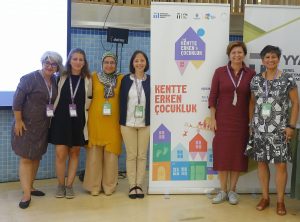RESEARCH
My research is guided by the Bronfenbrenner’s bioecological model to examine the complex relations among individual, interpersonal, and contextual factors on parenting, emotion regulation and developmental psychopathology.
In three interrelated lines, my research explores: (1) cultural socialization of children’s emotions (2) risk and protective factors in relation to children’s emotion regulation and adjustment, and (3) preventive interventions for at-risk children and families.

Cultural Socialization of Emotions
My first line of research focuses on the ways caregivers respond to their children’s emotion expression and experience, also known as emotion socialization. As young children frequently depend on their caregivers to help them manage strong emotions, and caregivers’ reactions to these emotions are crucial to the development of self-regulation, this research has implications for children’s future psychological adjustment. Yet, the question of how emotion-relevant values and rules in a cultural context might guide caregivers’ ES has received relatively less research attention. To better understand how parents respond to their children’s emotions in a variety of settings, I conduct collaborative work with colleagues from various countries including the US, Romania, Israel, and India.
Research on Risk and Protective Factors
My second line of research addresses how children’s behavioral problems become established early in life and which factors facilitate or hinder children’s acquisition of developmental competencies. These are important questions to better understand the potential precursors of children’s psychological problems and social competence to guide effective preventive interventions. In this research program, I have been particularly interested in the contribution of child temperament and parenting and contextual chaos, either in the home or daycare to children’s emotional self-regulation and social competence.
Research on Preventive Interventions
Preventive interventions have a central place in my orientation to clinical psychology. Reasons for prevention have become well established: When many of the adverse effects of disorders have already occurred, clinic-based interventions are lengthy, often expensive, and many children do not receive intervention due to limited availability of services or financial barriers. If not intervened, these problems get more chronic and harder to reverse. As alarmingly high numbers of children in Turkey are exposed to many risk factors (e.g., poverty, neglect) associated with psychological problems, it is critical to support at-risk children and their families with empirically validated programs.
To date, I have provided consultancy to the Mother-Child Education Foundation (AÇEV) for parent support programs and a children’s TV program in the national broadcaster of Turkey. More recently, I have been investigating the feasibility and acceptability of the home visitation model – a service delivery starategy adopted for the first time by the local municipalities in Turkey for low-income pregnant women and mothers of infants. This project has been an exemplary university-local governance collaboration as the implementers of the program consist of trained municipality staff.
Currently, we work to adapt and evaluate the effectiveness of an attachment-based intervention program implemented by nurses in the Family Health Centers that routinely follow up infants’ health.
My ultimate goal is to advance the understanding of prevention science as a way of supporting healthy functioning of children and establishing developmental equity, particularly for disadvantaged children and youth, and inform scholars as well as policy makers about the social and economic benefits of effective, high-quality prevention investments.
